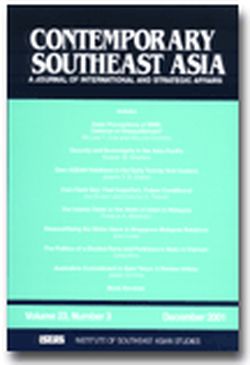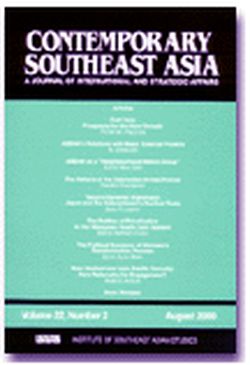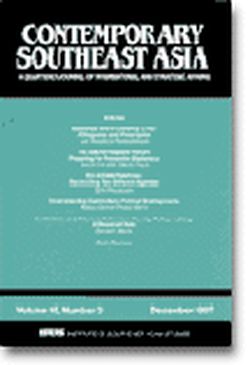Contemporary Southeast Asia: A Journal of International and Strategic Affairs. Vol. 29/1 (Apr 2007)

Date of publication:
May 2007
Number of pages:
218
Code:
CS29/1
Contents
-
Contemporary Southeast Asia: A Journal of International and Strategic Affairs. Vol. 29/1 (Apr 2007)
-
Preliminary pages
- ARTICLES
-
Embedding Security into Free Trade: The Case of the United States-Singapore Free Trade Agreement, by Eul-Soo Pang, author see abstractThe article is about the motivations and reasons for the United States and Singapore to sign an FTA, prompted by little trade expansion and snail-paced financial market opening within ASEAN, the Japanese-led resistance to the full flowering of APEC, the chronic breakdown of the WTOs recent trade liberalization negotiations, the structural changes in Singapore's economy, as well as unsettled security environment in Southeast Asia. Soon after the FTA went into effect, Singapore and the United States signed a strategic (defence) partnership agreement. Since 9/11, the two countries have found strong complementarity in each others strategic visions how to define the evolving security landscape for Southeast Asia, how to coordinate security responses for the region, and how bilateralism can be a viable fall-back position in cross-border trade and finance. The article also examines the inadequacies of the theories of old regionalism and suggests different ways to theorize new regionalism, identifying the domestic, regional, and global factors which have led to the paradigm shift in Singapore's strategy for future growth and survival and which have shaped the future East Asian policy of the United States.
-
The 1990 Elections in Myanmar: Broken Promises or a Failure of Communication?, by Derek Tonkin, author see abstractThe National League for Democracy (NLD) won a resounding victory in the May 1990 general elections, but was unable to persuade the ruling military junta to agree to the transfer of power. The State Law and Order Restoration Council (SLORC) had initially promised when they took control in September 1988 that whichever party won the elections could form the new government. But within months they backtracked as democracy activists, led by the NLD, pursued a vigorous campaign for basic civil rights, including freedom of expression, publication and assembly. Internationally, the junta could not compete for the worlds understanding against the iconic, charismatic personality of the daughter of the leader of Burma's independence, Aung San Suu Kyi. A more appropriate charge against the SLORC than failure to hand over power is that they did not allow elected members of the new National Assembly to play the major role in supervising the drafting of the new constitution, as they had promised both before and after the elections This article argues that the facts about the post-election constitutional process set out prior to the elections by the SLORC should be recognized if the continuing confrontation between the NLD and other pro-democracy parties and the military regime is to be fully understood.
-
Karen Nationalist Communities: The Problem of Diversity, by Ashley South, author see abstractThis article examines how, since the colonial period, different actors in and from Burma (Myanmar) have mobilized political support around sometimes competing notions of Karen ethno-nationalism. Christian elites in particular have sought to impose a homogenous idea of Karen-ness on this diverse society. These concepts and processes have been legitimized by outsiders, including missionaries and (more recently) human rights activists and aid workers. However, attempts to impose Karen unity from above have often proved divisive in practice, and have helped to fuel 60 years of ethnic conflict in Burma. This article also narrates the re-emergence of civil society networks within and between Karen communities over the past decade, and concludes by sketching the outlines of a consociational approach to the problem of Karen unity in diversity.
-
Party Politics and the Media in Indonesia: Creating a New Dual Identity for Golkar, by Dirk Tomsa, author see abstractIn 2004 the Golkar Party re-emerged as the strongest party in Indonesia when it returned to the top of the voting tally in the 2004 general election. One of the reasons that have been widely overlooked in explanations of the election results is the increasingly influential role of the media. This article will close this gap and argue that the media has directly contributed to Golkar's good electoral performance in 2004 as it helped the former regime party to communicate a major image change to the general public. As this article will demonstrate, Golkar transformed itself between 1999 and 2004 from a party that was almost exclusively associated with the New Order to a party with a dual identity, somewhere between nostalgic status quo sentiment and modern democratic ideas. This new identity has helped the party to maintain its electoral appeal in the face of increasing anti-party sentiment in Indonesia.
-
China's Performance in International Resource Politics:Lessons from the Mekong, by Timo Menniken, author see abstractAgainst the backdrop of population and economic growth China's water resources are getting scarcer. Uneven regional distribution and increasing pollution further reduce the locally available resources. Domestic measures applied to tackle the problems deriving from this scarcity produce international effects, giving rise to the apprehension that China will have to quench its thirst by increasingly exploiting sources that do not stem from or remain within its own territory. China's performance in international negotiations over water as well as in the regional Mekong regime reveals that to China trans-boundary cooperation is more a strategic option than a normative commitment. This article argues that alliances confronted with the impacts of Chinese water policy should focus on counterbalancing rather than just criticizing or even ignoring Chinese ambitions. With China being in a dominant position hydrologically, as well as politically, a second strategy would be issue linkage: offering incentives in non-water fields in return for cooperative management of shared water resources.
-
India and China: Rivals or Partners in Southeast Asia?, by Zhao Hong, author see abstractIn the immediate post-World War II era following independence, India as the second largest country in Asia played an active role as promoter of Asian regionalism. However, India's decision to pursue a policy of non-alignment in international relations was not well received by the West and also some ASEAN countries as that policy evidenced a pro-Soviet orientation during the Cold War (1947 91). In Southeast Asia, India s support for North Vietnam and its recognition of the Khmer Rouge regime of Heng Samrin in Cambodia did little to promote good relations between New Delhi and ASEAN. However, as the Cold War ended in the early 1990s and China's influence increased in Southeast Asia, India again realized ASEAN's importance in terms of politics, economy, and diplomacy, and consequently launched its Look East policy, the focus of which was how to become actively engaged in Southeast Asian affairs in the post Cold War era. This article attempts to analyse India s Look East policy and its new strategies towards ASEAN. It examines the factors affecting India s post Cold War policies towards ASEAN, the China factor in the changing relationship between India and ASEAN, and the India factor in Sino-ASEAN relations. It concludes with the suggestion that both these simultaneously rising powers, despite being rivals, can also become stakeholders or partners in ASEAN-led Southeast Asian regionalism.
-
Maritime Claims and Energy Cooperation in the South China Sea, by Leszek Buszynski, Iskandar Sazlan, authors see abstractThe unresolved maritime claims to all, or parts, of the South China Sea involve Vietnam, Malaysia, the Philippines, Brunei, Taiwan, and China, and have hindered the development of the hydrocarbon resources there. Rising oil prices and China's voracious appetite for energy have stimulated greater interest in the exploitation of the areas oil reserves. Despite the uncertainty, ASEAN countries have involved energy companies in exploration and drilling in their respective claims. Cooperation arrangements between national oil companies including Chinese have been negotiated which hold out the prospect of greater security, even in the absence of a settlement of the maritime claims. Energy cooperation may stabilize the South China Sea providing a secure operating environment for oil exploitation. In time, the way could be prepared for further steps which would involve the claimants in negotiations over a resolution of the maritime claims.
-
The Case of Agent Orange, by Michael G Palmer, author see abstractJust as America and its allies have become embroiled in what some have called another Vietnam, questions to do with the injustice of that earlier conflict have begun to resurface in international forums. In January of 2004, some 29 years since the official end of the Vietnam War the first action on behalf of Vietnamese victims of the principal US military herbicide, Agent Orange, was filed in a New York district court. In March the following year all claims were dismissed. This article seeks to present a commentary of this extraordinary case in view of history and the broader themes of politics, with international law, and its institutions as a handicap to accommodating individual victims of war. While identifying with this wider plight of victims the article serves as an update on developments in scientific research, bringing home the very serious threat of further contamination to the present day population in Vietnam.
- BOOK REVIEWS
-
BOOK REVIEW: Laskar Jihad: Islam, Militancy, and the Quest for Identity in Post-New Order Indonesia By Noorhaidi Hasan, by Zachary Abuza, author
-
BOOK REVIEW: Ensuring Interests: Dynamics of China-Taiwan Relations and Southeast Asia. Edited by Ho Khai Leong and Hou Kok Chung, by Joseph Cheng, author
-
BOOK REVIEW: Religious Pluralism in Democratic Societies: Challenges and Prospects for Southeast Asia, Europe, and the United States in the New Millennium. Edited by K S Nathan, by Abdul Rashid Moten, author
-
BOOK REVIEW: Religious Organizations and Democratization: Case Studies from Contemporary Asia. Edited by Tun-Jen Cheng and Deborah A Brown, by Maznah Mohamad, author
-
BOOK REVIEW: Japan in a Dynamic Asia: Coping with the New Security Challenges. Edited by Yoichiro Sato and Satu Limaye, by Richard Weixing Hu, author
-
BOOK REVIEW: Asia Pacific in World Politics. By Derek McDougall, by Varun Sahni, author




